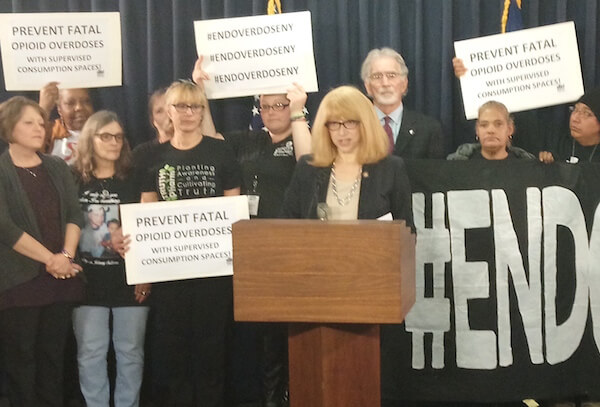Dr. Ross G. Hewitt, who oversees delivery of HIV services at MetroPlus Health Plan. | METROPLUS HEALTH PLAN
Even as local HIV health care advocates push to get both New Yorkers who are positive and those who want to stay negative into doctors’ offices, they are finding out that getting out of their own offices is an important part of that mission.
That’s the conclusion of Dr. Ross G. Hewitt, who is the associate medical director for HIV Services at MetroPlus Health Plan, a subsidiary of NYC Health + Hospitals that offers low to no-cost insurance to city residents eligible under a variety of Medicaid and Medicare programs.
When Hewitt arrived at MetroPlus two years ago, his mandate was to take “a fresh look” at how the organization was serving its HIV-positive members, many of whom participate in its HIV Special Needs Plan.
MetroPlus’ mission to “get out into the community”
“We were primarily a telephone-based care delivery service,” he said of how MetroPlus interacted with its HIV-positive members.
That approach enabled the organization to serve about 40 percent of its HIV-positive members, but left a majority unengaged.
“We had to get out into the community,” Hewitt explained, noting that a telephone-based approach is “limiting.”
Some members among the income-limited population MetroPlus serves don’t have phones or are on minute-based plans. Perhaps most importantly, “HIV is a very private matter,” he said. Establishing initial rapport with a member over the phone is difficult, and might even seem intrusive or intimidating.
Hewitt arrived at MetroPlus with a strong background in HIV care and science. A Brooklyn native, raised in the Bronx, he was a 1983 graduate of NYU’s medical school and, at Bellevue Hospital, worked with some of the city’s earliest AIDS patients. Later, in Buffalo, he spent nearly two decades running the AIDS Designated Center he created at Erie County Medical Center. There he was a principal investigator in AIDS clinical trial groups that studied the first 15 antiretrovirals that came to market.
At MetroPlus, he knew that moving service delivery beyond a telephone-based model would take significant training.
“We set out to make sure the skills of our staff were up to date and broad enough to handle the situations that can arise,” Hewitt explained.
The approach, he said, was to send MetroPlus “health and wellness advisors” into the city clinics and hospitals where its roughly 8,600 HIV-positive members typically access care.
“We are meeting them right at the clinic,” Hewitt said. “Traditionally managed care is looked at by consumers as a way to avoid providing care. That’s not our philosophy. We believe more contact means better health outcomes and, as a result, a lower cost of care.”
Though its HIV-positive members are spread across the organization’s insurance products, about 4,000 — or nearly half — belong to the HIV Special Needs Plan. Another 500 belong to a MetroPlus Medicare Plan.
The overriding goal of its outreach effort is to ensure that its HIV-positive members are getting treatment and then complying with their drug regimen. Antiretroviral treatments are highly effective when taken correctly, and will generally suppress the virus to undetectable levels, not only keeping an HIV-positive person healthy but also eliminating the risk they could infect someone else. Hewitt noted that Governor Andrew Cuomo’s End the Epidemic blueprint, which has been endorsed as well by the city, relies in significant ways on managed care organizations hooking their members up with care and treatment.
Hewitt offered a measure of the progress of MetroPlus’ more proactive approach. At the end of 2015, the organization’s statistics showed that 75 percent of its members were virally suppressed. One year later, that number had risen to 82 percent.
When Hewitt arrived in 2015, a key concern at MetroPlus was engaging members who were not virally suppressed or, in some cases, not even in care at all. The organization’s End the Epidemic Program had identified about 700 such people as of August 2015. The most recent health numbers for that group indicated that 32 percent now show zero viral load.
Moving that number is the toughest slog for MetroPlus’ health and wellness advisors.
“There is no question but that homelessness, substance abuse, and mental health or ongoing psychiatric situations are the biggest barriers to getting those who are not virally suppressed into care,” Hewitt explained.
That means working with city agencies, community organizations, and health care providers across a broad spectrum. The city’s HIV/ AIDS Services Administration qualifies HIV-positive New Yorkers for housing assistance, though MetroPlus may work with a case management group such as Gay Men’s Health Crisis, Housing Works, or Harlem United in connecting its members to HASA.
On mental health and substance abuse issues, MetroPlus partners with Beacon Health Options, which provides clinical management on behavioral health issues. Hewitt said that Mayor Bill de Blasio’s focus on improving mental health care access in the city has also enhanced the availability of services for his organization’s members.
In addition to his management of MetroPlus’ services for HIV-positive members, Hewitt has also taken the lead on the organization’s efforts to get at-risk members who are HIV-negative to look at pre-exposure prophylaxis, or PrEP, as a way of avoiding transmission of the virus.
Through a published brochure and outreach at community events, he said, MetroPlus is eager to have New Yorkers know that PrEP is covered by its insurance plans. To date, he said, MetroPlus is aware of 600 of its members who are taking PrEP, a figure that almost doubled from the end of 2015 to one year later.
Roughly 95 percent of its members on PrEP, Hewitt said, are men, suggesting that uptake so far is largely among men who sex with men. At this point, however, MetroPlus does not have a ready read on the age, ethnicity, and other demographic details of its PrEP population, data that would be valuable to better determine whether its uptake is reaching the portion of the gay and bisexual population at greatest risk for HIV transmission.
One big concern Hewitt mentioned regarding PrEP was the potential repeal of the Affordable Care Act, something that could mean that many of those now taking the drug “would lose their easy access” to it from an insurance coverage standpoint.
“Perhaps there will be other ways” for at-risk people to find affordable options for getting PrEP, he said, but the current debate in Washington is one that carries great risk for everyone’s hope to finally bring HIV down below epidemic levels.
Hewitt will be one of the featured speakers at Gay City News’ 2017 Impact Awards gala at the Grand Prospect Hall in Brooklyn on March 30 (gaycitynews.nyc/impact). MetroPlus is the event’s presenting partner.



































